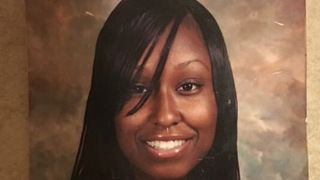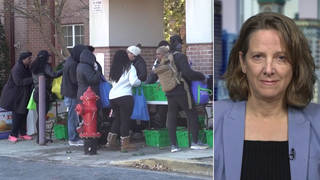
Guests
- Victoria Lawfreelance journalist and author of Resistance Behind Bars: The Struggles of Incarcerated Women. Her recent article for Rewire is called “Facing Years in Prison for Fleeing Abuse: Cherelle Baldwin’s Story is Far from Unique.”
- Cynthia Longthe mother of Cherelle Baldwin, a 23-year-old Connecticut mother on trial for killing her alleged abuser. Cherelle faces 25 to 60 years if convicted.
Update: Later on Thursday, after this segment aired, a 12-member jury found Cherelle Baldwin not guilty of murder in the death of her ex-boyfriend, allowing her to go free after nearly three years behind bars. According to the Huffington Post, Baldwin collapsed to the floor in tears as the verdict was announced, crying, “My baby will have his mommy back.”
Jurors in Connecticut are deliberating the fate of Cherelle Baldwin, a 24-year-old mother accused of killing her alleged abuser. Baldwin is charged with the 2013 killing of her ex-boyfriend, Jeffrey Brown, who Baldwin alleges had stalked and abused her. According to court documents, Brown had repeatedly threatened Baldwin, took her credit cards and money, and assaulted her during visits to see their son, who lived with Baldwin. Baldwin eventually attained a court order barring threats, harassment and assaults during visits, but just before Brown died, he sent Baldwin a series of threatening text messages. Then, according to a police affidavit based on Baldwin’s statements, Brown showed up at her house, climbed through her window and attacked her, choking her with his belt. Baldwin escaped and managed to get inside her car, but so did Brown, who again choked her. What happened next is hard for even Baldwin to remember, but when police arrived they found Baldwin on the ground with a broken leg and Brown dead in front of the car, pinned against the garage wall. Baldwin was arrested on murder charges. Baldwin has already spent nearly three years in jail. If convicted, she could spend decades in prison. We are joined by Charelle Baldwin’s mother, Cynthia Long. We’re also joined by Victoria Law, a freelance journalist whose recent article for Rewire is “Facing Years in Prison for Fleeing Abuse: Cherelle Baldwin’s Story is Far from Unique.”
Transcript
NERMEEN SHAIKH: We begin today in Connecticut, where jurors are deliberating the fate of Cherelle Baldwin, a 24-year-old mother accused of killing her alleged abuser. Baldwin is charged with the 2013 killing of her ex-boyfriend, Jeffrey Brown, who Baldwin alleges had stalked and abused her. According to court documents, Brown had repeatedly threatened Baldwin, took her credit cards and money, and assaulted her during visits to see their son. Baldwin eventually attained a court order barring threats, harassment and assaults during visits, but Brown continued sending Baldwin threatening text messages.
Then, according to a police affidavit based on Baldwin’s statements, Brown showed up at her house, climbed through her window and attacked her, choking her with his belt. Baldwin escaped and managed to get inside her car, but so did Brown, who again choked her. What happened next is hard for even Baldwin to remember, but when police arrived they found Baldwin on the ground with a broken leg, and Brown was dead in front of the car, pinned against the garage wall. Baldwin was arrested on murder charges.
AMY GOODMAN: Since the incident, Cherelle Baldwin has spent nearly three years in jail. After a trial in 2015 ended in a hung jury and was declared a mistrial, prosecutors moved to retry Baldwin. If convicted, she could spend decades in prison.
The case has caught the attention of domestic violence organizations nationwide, who are calling for prosecutors to drop the charges against Baldwin. Many groups have cited the case as an example of how black women are disproportionately imprisoned when they defend themselves against domestic abuse. Stacy Suh, a Bay Area activist and organizer with the domestic violence survivors advocacy group #SurvivedAndPunished tweeted a meme with Cherelle’s picture, which stated, quote, “Domestic violence exists in every community, but it is Black women who are consistently denied the right to self-defense and to survive,” she said.
Well, for more, we’re joined by Cherelle Baldwin’s mother, Cynthia Long. We’re also joined by Victoria Law, a freelance journalist and author of Resistance Behind Bars: The Struggles of Incarcerated Women. Her recent article for Rewire is “Facing Years in Prison for Fleeing Abuse: Cherelle Baldwin’s Story is Far from Unique.”
We welcome you both to Democracy Now! Let’s begin with Cynthia Long, Cherelle Baldwin’s mother. You’ve been going to the trial of your daughter. She has already faced—she’s already served three years in jail—she faces 60 more—for murdering her ex-boyfriend. Can you talk about this case?
CYNTHIA LONG: Well, there are certain things that I can’t talk about, but there are some things I can. Cherelle, my daughter, has been in prison for over three years—well, almost three years. And I just find that it’s very unjustifiable that they keep her in there after a mistrial and not lowering her bond. You know, we went back to court to get the bond lower, and the judge refuses to do it. So, you know, we had to really ask for another trial, like we pretty much had to beg. The lawyer had to pretty much beg to get another retrial, because it took them a while to figure out should they retry her or not, or should she take a plea deal.
You know, it’s been a very difficult time for me and my family. It’s been a very hard struggle, and especially for Cherelle, because she—you know, she’s innocent. She’s innocent. She was home. She was in her own home. She was minding her own business. He had no business there. So, you know, I don’t understand why the court and the police department doesn’t understand that. There was a court order for him to stay away from her. So—
AMY GOODMAN: So, let me bring—
CYNTHIA LONG: I think that—go ahead. I’m sorry.
AMY GOODMAN: Let me bring Victoria Law into this conversation. You have been writing about this case for some time now. Lay out the whole context and the history, of the abuse and the order of protection.
VICTORIA LAW: So, Cherelle Baldwin met the man who became the father of her child, Jeffrey Brown, when she was a 19-year-old, so in 2010. They started a relationship. And unbeknownst to many family members, there was abuse in the relationship, which is not uncommon. When abuse begins in a relationship, people may minimize the abuse, they may not realize that they are being controlled or manipulated. Abuse is not necessarily walking down the street with lots of bumps and bruises. The physical assaults may only happen a couple of times, and that’s enough to intimidate people. But what Cherelle’s family has told me is that they noticed that she began pulling away a little bit more, so she wasn’t as—she wasn’t at their family gatherings as much. She often had to check with Jeffrey before she was able to make decisions. And Cherelle’s mother said that this was not like her.
Fast-forward, they had a baby boy together. And by 2013, the couple had actually split up. And domestic violence advocates will tell you that it’s—that ending the relationship is often the most dangerous time for a domestic violence survivor, because that threatens the abuser’s control, and they are more likely to lash out and try to fatally harm their ex-girlfriend or their ex-partner. And so, in 2013, she—they had split up. He had moved out, but he continued to harass her. He continued to come by and use their son as a reason to stay in contact with her and to intimidate her, to take her money, to take her phone. She finally had an order of protection against him after he showed up at her house and threw her clothes out the window and then smashed her cellphone. The police showed up. They saw what had happened. They arrested him. They gave her an order of protection. And he continued to violate this order of protection. So he was not supposed to threaten her. He was not supposed to intimidate her. He was not supposed to—he definitely was not supposed to assault her.
And on the morning of May 18, 2013, he sent a series of threatening text messages and then showed up at her house, broke into her house, tried to strangle her, tried to hit her with—hit her with his belt. And she tried to escape. She got into her car. He tried to, you know, get into the car after her. And that was when he ended up dead, and she ended up with a broken leg. And so, by the time the police arrived, this had all happened. And witnesses say that they saw him attacking her that morning.
AMY GOODMAN: And where was the child?
VICTORIA LAW: The child was still in the house.
NERMEEN SHAIKH: Cynthia Long, can you talk about what you recall of Jeffrey’s behavior and what you know, or knew then, about their relationship, your daughter’s relationship with Jeffrey Brown?
CYNTHIA LONG: Well, in 2012, I noticed that Jeffrey’s behavior became a little difficult. He was very controlling of Cherelle, like she just couldn’t do anything without his permission. She couldn’t go anywhere. We had a family gathering in Miami, Florida, and we all went down, and I noticed that Cherelle was the only person missing from the gathering. And I’m like, “Where is Cherelle?” And he had her in the hotel, like, you know, she wasn’t able to have any kind of contact with us. And, you know, it was just kind of like unusual. And then he just started really acting very, very controlling, and he would stalk her. She would be at my house, and he would be stalking her, he would be calling her. And it was just kind of like weird. And, you know, she never really said that he was doing anything, but, you know, at the time, she was hiding it also, so—and that’s what abused women does. They hide things. So, Jeffrey—I don’t know—he was just so, you know, controlling, and he was determined that Cherelle was going to be with him no matter what. And, you know, this is what we saw in him. And, you know, I just feel like that if the protection order had a—did a little more for Jeffrey besides just hand him a piece of paper, you know, things would be different.
AMY GOODMAN: So, she’s been in jail for three years, was not convicted at this point. There was, though, a first trial.
VICTORIA LAW: Yes.
AMY GOODMAN: Explain, Victoria.
VICTORIA LAW: Yes. So, in early 2015, Cherelle Baldwin went to trial on first-degree murder charges. It was a six-week trial. After five days of deliberation, the jury came back and said that there was a hung jury, meaning that they could not all agree. Apparently, 11 jurors wanted to acquit her of charges, and there was one holdout. And after five days of deliberation, they were unable to budge the one holdout. The one holdout was unable to budge the other 11 jurors. So they came back to the court. The judge declared a mistrial. And at that point, the prosecutor’s office could have said, “We’re done. You know, like we’re not retrying the case.” And instead, they said, “We’re going to retry this case.” So Cherelle Baldwin goes back to prison, because in Connecticut women who are detained awaiting trial are sent to the state’s prison, not to a local jail. So she goes back to prison for almost another year, and now she’s on trial again.
NERMEEN SHAIKH: And can you explain why her bail was set so high, a million dollars?
VICTORIA LAW: Supposedly—so, bail is set not necessarily as any sort of risk assessment, but it’s often set to supposedly ensure that people come back to court. But in Cherelle Baldwin’s case, she has family, she has a loving family, she has a son, she had a job, she had strong ties to the community. There was no need to set her bail at $1 million. This seems more punitive. And obviously her family has not been able to raise the money, so therefore she is not allowed to be at home helping to prepare for her defense, which is easier when she’s outside; unable to see her son, except on visits twice a month; and unable to be with the rest of her family.
AMY GOODMAN: According to an article published by the Connecticut Law Tribune earlier this week about Cherelle’s case, Connecticut law states, quote, “when police respond to a domestic violence call, if there is evidence to suggest some sort of altercation took place, at least one party has to be arrested. Often, police who cannot quickly discern who the instigator was will arrest both parties. On average across the country, dual arrests make up 4 to 6 percent of police responses. However, in Connecticut, dual arrests occur almost 20 percent of the time.” The article went on to quote a 2007 Department of Justice study that found Connecticut’s mandatory arrest law forces officers to “throw their common sense out the window.” Victoria, talk about what happens in these dual arrests.
VICTORIA LAW: So, in these kinds of cases where there is a mandatory arrest and police are required to make an arrest, they show up, and it’s up to the officer to determine who to arrest. And oftentimes if the person who is the victim of domestic violence doesn’t fit their perception of who a domestic violence victim looks like—say, she is loud; say, if she is angry; say, if she is large, black, a woman of color; if she has fought back in any way, even if the fighting back is very disproportionate—so, if she is being badly beaten or strangled, and she throws a remote control at her abuser, they might—the abuser might say, “Well, she also did this to me,” and that could be a dual arrest. So, for many women, particularly women who don’t fit this preconceived notion of what a victim looks like, calling the police may very well end up with them behind bars, as well.
NERMEEN SHAIKH: So were those some of the arguments that the prosecutors made in Cherelle’s case?
VICTORIA LAW: In Cherelle’s case, no. Fortunately, as far as I know, when the police showed up, they did not threaten to arrest Cherelle. But across the country, we see many women and domestic violence victims talk about how oftentimes they’re not taken seriously or they’re perceived also as being equally aggressive.
AMY GOODMAN: Talk about the Marissa Alexander case, became famous—
VICTORIA LAW: Mm-hmm, yes.
AMY GOODMAN: —after George Zimmerman killed Trayvon Martin.
VICTORIA LAW: Yes.
AMY GOODMAN: Here was a woman who had been abused. And explain what happened to her, facing 20 years in prison, versus what happened to George Zimmerman.
VICTORIA LAW: So, Marissa Alexander was a Florida mother of three. She had just given birth to a baby nine days earlier. And she was estranged from her husband, but because they had a baby together, they were actually—he was actually at her house. And she went to the bathroom, and he looked at her phone, which is something that abusers do. They want control, so they’re looking at your phone, they’re monitoring your emails, they’re isolating you from your family. He looked at her phone and noticed that she had sent some of the baby photos to her ex-husband. And he—when she came out of the bathroom, he attacked her. He shoved her against the wall. He tried to strangle her.
She escaped and fled into the garage, and she had meant to get in her car and drive away. She got to the garage, realized she had forgotten her keys and her cellphone inside the house in her hurry to get away from him. So she had no choice but to re-enter the house. And she was in Florida. She had a registered and licensed gun. And what she said is that she fired the gun at the ceiling as a warning shot to say, “Don’t come any closer.” And he did not come any closer. He left the house, and he immediately called the police and said, “My estranged wife tried to shoot me.” And she was arrested and tried.
AMY GOODMAN: This is Michelle Alexander—not Marissa Alexander, but Michelle Alexander—back in 2013, author of The New Jim Crow, talking about Marissa Alexander’s case.
MICHELLE ALEXANDER: The case you just described is, you know, a stark example of the discriminatory application of the Stand Your Ground law itself. You know, here is a woman firing shots in the air to protect herself from what she believed is an abusive spouse, and she winds up getting 20 years, while George Zimmerman, you know, is released scot-free after pursuing someone based on racial stereotypes and assumptions of criminality. She received a 20-year sentence because of harsh mandatory minimum sentences, sentences that exist in Florida and in states nationwide.
AMY GOODMAN: That’s Michelle Alexander talking about Marissa Alexander. Ultimately, what happened?
VICTORIA LAW: Ultimately, what happened was Marissa Alexander tried to plead Stand Your Ground, which, as we all know, George Zimmerman was successful in doing, and the judge ruled that she could not argue Stand Your Ground because he said that she could have retreated from her own house. So we see the ways in which the law is not equally applied to people in the state of Florida, or perhaps anywhere. And she ultimately was convicted and sentenced to 20 years in prison. An appeals court overturned her conviction, and, as in the case of Cherelle Baldwin, the prosecutor could have decided not to retry her. But instead, the prosecutor, who is the same prosecutor who tried George Zimmerman, vowed to retry her and seek a 60-year sentence, if she was convicted.
NERMEEN SHAIKH: And, Cynthia Long, before we conclude, could you tell us where Cherelle’s son is, who’s now five years old, and who’s been taking care of him, and also talk about some of the support that you’ve received from advocates of survivors of domestic abuse?
CYNTHIA LONG: At this time now, the baby is in split custody with me and the other grandmother. We’re sharing custody. So he spends five days with her and five days with me. He—lovely little child. Right now, the whole advocate people are—they’ve just been so wonderful. Holly, out of Chicago, has been excellent. There’s been a lot of support from all the domestic violence advocates around the country, even in the United Kingdom. I had some people from Australia who Facebook us, and they’re showing all their support and love for Cherelle. I’m just happy that everyone was able to hear Cherelle’s story and hear about it, because we couldn’t get any kind of support in the beginning of this, and now that everyone knows about her story, you know, we’re very grateful for all the support out there. And we want to thank the Stamford advocate, domestic crisis center, for coming to her closing argument on Thursday—Wednesday. But they’ve been so supportive, and I just want to thank everyone.
AMY GOODMAN: And does Cherelle get to see her son?
CYNTHIA LONG: Yes, I take him up there every other Sunday. Not so much during the week, but every other Sunday I take him up there. So he’s pretty—he’s fully aware who his mother is.
AMY GOODMAN: And so, now the Bridgeport court, the case is in the jury’s hands, is that right, Cynthia?
CYNTHIA LONG: Yes, yes.
AMY GOODMAN: And you’re just awaiting their decision.
CYNTHIA LONG: Yes.
AMY GOODMAN: Well, we’ll certainly continue to cover this. Cynthia Long is the mother of Cherelle Baldwin, a 23-year-old Connecticut mother on trial for killing her alleged abuser. Cherelle faces 25 to 60 years in prison, if convicted. And thank you very much to Victoria Law, freelance journalist, author of Resistance Behind Bars: The Struggles of Incarcerated Women. Her recent article for Rewire is headlined “Facing Years in Prison for Fleeing Abuse: Cherelle Baldwin’s Story is Far from Unique.” We’ll link to your article, and thanks so much.
This is Democracy Now!, democracynow.org, The War and Peace Report. When we come back, Adam Hochschild on Spain in Our Hearts: Americans in the Spanish Civil War. Stay with us.












Media Options